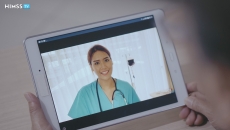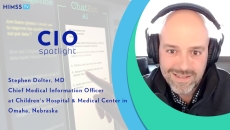Videos
Dr. Monica Bharel, Advanced Clinical senior public health advisor and former commissioner of the Massachusetts Department of Public Health, said public-private partnerships can help organizations integrate data across different sectors to understand the root causes of illness and adjust how care is delivered.
Hospitals have to think creativity and differently because staffing shortages aren't going away, says Wendy Deibert, Caregility's vice president of Clinical Solutions.
HIMSS23
HIMSS volunteer Ricardo Silva says he meets the people who are transforming healthcare, and then takes that back to the classroom.
Pharma U offers 10 weeks of education, from how drugs are made to mentoring and coaching, says Naomi Fried, CEO and founder of digital health accelerator PharmStars.
HIMSS23
Members can network, stay educated and connect with colleagues, says Sepi Browning, IT director/business partner at Piedmont Healthcare.
HIMSS23
Providers can get ahead of the bill to better communicate payment options, say Sphere Chief Revenue Officer Ryne Natzke and Chief Product Officer John Welch.
Hospitals need "precision experiences" for individuals to feel they’re being seen and heard, says Dr. Adrienne Boissy, Qualtrics CMO and Cleveland Clinic staff neurologist.
The biggest danger is validating the data so that it's not a question of "garbage in, garbage out," says Dr. Stephen Dolter, CMIO for Omaha's Children's Hospital & Medical Center.
HIMSS23
Because health organizations are paid by capitation, incentives are aligned to keep the patient healthy, says Ran Balicer, chief innovation officer at Clalit Health Services.
Biometric wearables predicted 73% of COVID-19 cases more than two days before service members felt sick, says Jeffrey Schneider at DoD and Navin Natoewal at Philips.









